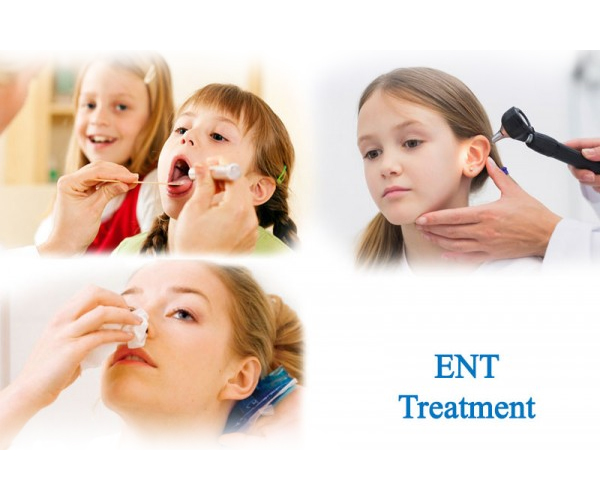ENT
ENT treatment can be handled by either a general pracitioner or an otolaryngologist (ENT). Though general practitioners treat a number of ENT disorders, your family doctor may not feel comfortable treating you and may refer you to an ENT specialist. Seeking out a specialist on your own may also be helpful if you are unhappy with the care you have received, need a second opinion or want more information than your general practitioner can provide.
What ENT Treatments Are Available?
The best ENT treatment will vary according to what type of problems or symptoms you are having. In the early stages of a disorder, surgical procedures may not be warranted, as in tonsillitis, for example. Early treatments will also depend on whether or not the disorder is related to an infection. If an infection is suspected, tests may be performed to determine whether the cause is bacterial or viral. Viral infections will not respond to antibiotics.
If surgical procedures are indicated, the doctor or nurse will give you instructions to follow before the surgery, including when you need to stop eating solid foods, when to stop drinking clear liquids and whether or not you will need to start or stop any medications before the surgery.
Ear, Nose and Throat Conditions & Treatments
Congestion, allergic rhinitis, a deviated septum and mouth sores are just a few of the varied health problems that occur in this region of the body. Information about ways you can relieve symptoms at home and when you should see a physician can be found in this section.
Nose
- Sinus
- Rhinoplasty
- Sinusitis
- Sinus Infection
- Obstruction
- Drainage
- Deviated Septum
- Allergic Rhinitis
- Nasal Fracture
Ear Conditions
Conditions that impair ear function can be as minor as wax buildup or as serious as congenital deafness. This section contains valuable information about how to protect your hearing, how to recognize indications of hearing disorders, and what ENT-head and neck physicians can do to evaluate and treat these problems
- Ear Discharge/Drainage
- ASOM/CSOM
- Tympanoplasty
- Ultrasound Therapy
- DNS/Polyps
- Otitis Media
- Swimmer’s Ear
- Ear Wax
- Auricular hematoma
Hearing Conditions:
- Sensorineural Hearing Loss
- Noise Induced Hearing Loss
- Child Hearing Loss
- Age Related Hearing Loss
- Deafness
- Tinnitus
- Meniere's Disease
- Sudden Hearing Loss
Throat Conditions:
Maladies of the throat can be a mere nuisance or a major ordeal. Tonsillitis, voice disorders, and even hoarseness all interfere with our ability to communicate. Many of these conditions can be improved or corrected with the care of an ENT physician or head and neck surgeon.
- Thyroid Nodules
- Tonsil and Adenoids
- Neck Cancer
- Reflux
- VGERD
- LPR
- Infections
Head & Neck Conditions
Many surgical advances are being made in this area. Procedures such as tonsillectomy and facial plastic surgery are becoming less invasive, and new procedures are being developed to treat serious problems such as cleft palate, sleep apnea and deafness.
- Bell's Palsy
- Children and Facial Paralysis
- Children and Facial Trauma
- Cleft Lip and Cleft Palate
- Dizziness and Motion Sickness
- Facial Plastic Surgery
- Facial Sports Injuries
- Fine Needle Aspiration
- Head and Neck Cancer
- Pediatric Head and Neck Tumors
- Sinus Headaches
- Sinus Pain: Can Over-the-Counter Medications Help?
- Sinusitis: Special Considerations for Aging Patients
- Thyroid Disorders and Surgery
- TMJ Pain
Pediatric Conditions
Children face many of the same health problems that adults do, however symptoms may show themselves differently and treatment methods that work well in adults may not be appropriate for children. This section identifies common pediatric ENT, head and neck ailments and what you should ask your child’s doctor about diagnosis and treatment.
- Allergic Rhinitis (Hay Fever)
- Child Screening
- Children and Facial Paralysis
- Children and Facial Trauma
- Cochlear-Meningitis Vaccination
- Could My Child Have Sleep Apnea?
- Day Care and Ear, Nose and Throat Problems
- Facial Sports Injuries
- How Allergies Affect your Child's Ears, Nose and Throat
- Laryngopharyngeal Reflux and Children
- Noise-Induced Hearing Loss in Children
- Pediatric Food Allergies
- Pediatric GERD (Gastro-Esophageal Reflux Disease)
- Pediatric Head and Neck Tumors
- Pediatric Obesity and Ear, Nose and Throat Disorders
- Pediatric Sinusitis
- Pediatric Thyroid Cancer
- Second Hand Smoke and Children
- When Your Child Has Tinnitus
- Why Do Children Have Earaches?

Contact us
- Address :
- 1, Jacob Road, Near Shiv Mandir, Civil Lines, Madrampur, Civil Lines, Jaipur, Rajasthan 302006
- Mobile No. :
- +91 9549675000
- Phone No. :
- 0141 2222111
- Email Id :
- ghrc.jaipur@gmail.com
